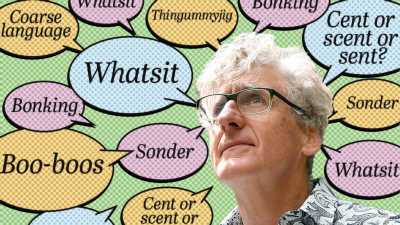Save articles for later
Add articles to your saved list and come back to them any time.
Later this month, Tim Finn will tour the east coast, playing songs from his 40-year backlist. During the lead-up, I chatted with Tim on radio, asking him about that wonderful bubble a musician must know, where the crowd breathes in sync with your rhythm, a secular worship in a way. “What does it feel like?” I asked.
“Like love,” said Tim, because what other word was there? As emotions go, love felt right, if not imprecise. After all, we serenade and dance for love, we marry and forgive, we change nappies and feed cats out of love too. Personally, if I was love, I’d feel exhausted. Maybe Tim chose love as love is all we need, to borrow from The Beatles.
Tim Finn: perhaps all we need is tarab.
Yet there is an alternative. Turns out the dictionary can help, whether that’s an Arabic-English volume, or An Emotional Dictionary (Hachette, 2022) by Oxford lexicographer Susie Dent. The subtitle sums it up: “Real Words for How You Feel from Angst to Zwodder.” Angst we know (drawn from Greek’s ankhein – to strangle), while zwodder is a drowsy state of laziness, origins unknown.
Lying in between is tarab, an Arabic import defined as “the emotions that flow from music”. Think of the sorcery your favourite song wields. Or don’t think, as tarab captures that trance we enter when logic is lulled and the chords take charge. French writer Victor Hugo said “music expresses that which cannot be put into words and that which cannot remain silent”. Cue tarab, perhaps the word Tim Finn was seeking if either of us knew it existed.
Rumpelstiltskin, the German folktale, teaches us the power of names. Say the right word and you can rescue your child, or pin that slippery feeling, be that hyppytyynytyydytys – the Finnish word for the easeful act of sinking into your favourite couch – or smultronställe, literally a place of wild strawberries: the Swedish notion of a place holding sentimental value.
The Tyrolean Alps caused the first recognised cases of nostalgia.Credit: iStock
For Swiss mercenaries in 1688, that place was the Tyrolean Alps, the villages the soldiers missed when fighting on the lowlands. Johannes Hofer, the Basel doctor treating the men, coined the term nostalgia (“an ache to return home”), banning the wistful effect of alpenhorn ballads in the trenches due to their potent tarab.
For every human moment, there is a word, if you only know where to look. Take alysm (the boredom of being unwell), or basorexia: the urge to kiss someone. Consider kvell – the delight you take in another’s success, often the lot of braggy parents, culpable of philodoxy, or fondness for one’s own opinions.
Yet sometimes an emotional label needs coining, as Mitchell Airport in Milwaukee proves. There, beyond the X-rays, is a recombobulation area, a space assigned for passengers to gather their thoughts and belongings. Meanwhile, sonder, another invention, via John Koenig’s online Dictionary of Obscure Sorrows, is “the realisation that other lives progress around you without your ever being aware of them”.
No matter if you’re forswunk (weary from overwork) or suffering acatalepsy (existential anxiety) from life’s merry-go-sorry, there is seijaku (tranquillity amid chaos) to be found in the guise of a word, from gigglemug (a constant smiler) to umarell: an old man watching a building site.
Thanks to Susie Dent’s coddiwomple (purposeful meander) across the human heart, we can avoid onomatomania (failure to find the right word). Now, instead of love, we may summon words such as cwtch – a lingering Welsh hug – or oeillade (an amorous glance). We can specify the limerence of first love, or even the tarab of beloved melodies.
To read more from Spectrum, visit our page here.
The Booklist is a weekly newsletter for book lovers from books editor Jason Steger. Get it delivered every Friday.
Most Viewed in Culture
From our partners
Source: Read Full Article


